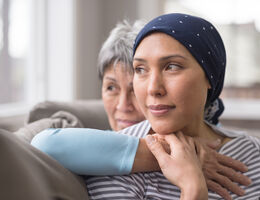
Breast cancer affects more than just your physical health. It affects your emotional health as well.
And, just as you need to treat the physical effects of breast cancer, it's also important to find positive ways to deal with your feelings about the disease.
What you may feel
Every person's emotional response to a cancer diagnosis is different. You may feel:
- Anger.
- Fear.
- Stress.
- Anxiety.
- Depression.
- Sadness.
- Guilt.
- Loneliness.
These feelings are normal, according to the National Cancer Institute (NCI) and other experts. At times, the range of emotions you feel may be overwhelming. There may be days when you feel especially down, but facing your emotions in a positive way can help you begin to feel better.
Tips to help you cope
It can be easier to face the reality of breast cancer by learning as much as you can about the disease, according to the NCI.
Talk to your doctor about your condition and treatment options. Feel free to ask questions, and have your doctor recommend books or journal articles that can help you learn more.
Other ways to cope with your feelings:
Lean on your family and friends. Know that you're not alone. Your loved ones can support you in many ways. Family members or friends can go with you to doctor visits or treatment sessions or help with errands or household chores.
Find a good listener. Though it can be difficult to talk about breast cancer, sharing your thoughts and feelings with a trusted friend or family member can help you feel better. A counselor or a spiritual leader can offer support as well.
If you don't feel like talking, though, it's OK to let others know that. There are other ways to share your feelings. You might find it helpful to keep a journal. Writing can help you sort through and deal with your emotions.
Express your feelings. It's normal to have days when you feel down. Though your instinct may be to try to spare those around you from your strong feelings, don't try to act cheerful when you're not. Putting up a false front could keep you from getting the help you need, according to the NCI.
Take care of yourself. Maintaining your well-being is an important step to getting through breast cancer. Get the rest you need, eat well, try to exercise if you're up to it and take time alone for yourself when you need it.
Learn from others. You might consider joining a breast cancer support group. Women who have been through breast cancer often share a special bond.
A cancer support group allows people to:
- Discuss what it's like to have cancer and share ways to cope.
- Lean on each other to get through cancer together.
- Learn about new developments in cancer treatment.
If you think you'd like to join a support group, talk to your doctor or call your local hospital for information about cancer support programs.
Reviewed 12/13/2024
Sources
- American Cancer Society. "Adjusting to Life With Cancer." https://www.cancer.org/cancer/survivorship/coping/adjusting-to-life-with-cancer.html.
- American Cancer Society. "Psychosocial Support Options for People With Cancer." https://www.cancer.org/cancer/survivorship/coping/understanding-psychosocial-support-services.html.
- National Cancer Institute. "Cancer Support Groups." https://www.cancer.gov/about-cancer/coping/adjusting-to-cancer/support-groups.
- National Cancer Institute. "Emotions and Cancer." https://www.cancer.gov/about-cancer/coping/feelings.